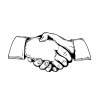The 100 Years Club Installment #70: 10 Years of Help (or Not)
 Reading Time: 4 minutes
Reading Time: 4 minutesEach May, I’m compelled to write something about “help” (as in May Day).
I was actually kinda shocked to realize that this series (my “Bad Girl, Good Business” blog) was originally launched in 2014, so I’ve been dispensing random advice and perspectives for a decade.
I searched my blogs for the word “help” and came up with this: lots and lots of references to the word. So, what does that mean?
Like Erma Bombeck, I have tried to offer useful tips for navigating life (and now aging).
I helped my older brother remove a stain from his shirt with a Tide Stain Stick this week. He was amazed and grateful. I am trying to focus on the little ways I assist people daily, even if it’s just erasing cream cheese from a cotton blend.
Of course, helping others is a bit of a self-gratifying act. We feel good when we get thank yous or public accolades (or even just acknowledgments on our social media posts). I get an occasional fan mail comment or personal note.
But, as you think about HELP this month and every month, contemplate:
- Who are you helping, and how are you helping them. Don’t assume you know how to assist
 someone. Asking, “Can I help?” or “How can I help?” is generally a better strategy than just jumping in and (metaphorically) grabbing someone’s arm and dragging them across the street. (Because, for all you know, they don’t even want to cross that road!)
someone. Asking, “Can I help?” or “How can I help?” is generally a better strategy than just jumping in and (metaphorically) grabbing someone’s arm and dragging them across the street. (Because, for all you know, they don’t even want to cross that road!) - How can others help you? Although I’ve always been pretty good at identifying and managing resources in my work life, I suck at asking others for help. I grew up in an environment where I didn’t typically get it, even if I asked. People still assume that I’m 100% self-sufficient and happy all the time. I need to help dispel that myth — and know which people to ask for what types of help. And I’m getting better at the “how to ask.” (See below.)
- Is the give-and-take in your life well-balanced? Often, natural caretakers are so consumed with making sure others are fulfilled that they don’t take enough time for self-care. Here’s a simple (and dare I say helpful?) guide to ensuring your relationships are in sync.
How to Ask for Help
I’m still figuring this out myself, but here’s what I know.
- First, get really clear on what you need. It may take some time and thought. Be realistic and specific.
- Then, identify who can give you that assistance. You wouldn’t ask The Geek Squad to give you a pelvic exam or EKG. Seek out people who care enough and have the skills to provide assistance or guidance.
- Ask for what you need—directly, precisely, and at a time when your helper is open to listening. The link below is a good guide to crafting a request for assistance.
Above all, ensure you don’t become resentful over time if a relationship is imbalanced. If you’re always the “Nurse Nancy” and “patients” keep ripping off their dressings and spitting out their medicine, you may just need to walk away and let them suffer.
And, if you’re grateful to someone in your life for continually helping you when they need it, be sure to express your gratitude and ask if they need anything in return.
Remember, too, that no matter how many wise and helpful people you have around you, doing work from within will ultimately take you far. In the wise words of Dr. Suess:
“You can get help from teachers, but you are going to have to learn a lot by yourself, sitting alone in a room.”
Helpful hints:
 |
How to ask for help |
 |
How to identify helpful people (although I think some of these can easily be faked) |
 |
These things are NOT comforting! |
| Want to get paid to help? These are considered “helping professions.”
Should I be bummed that blogging and podcasting aren’t on the list? |

